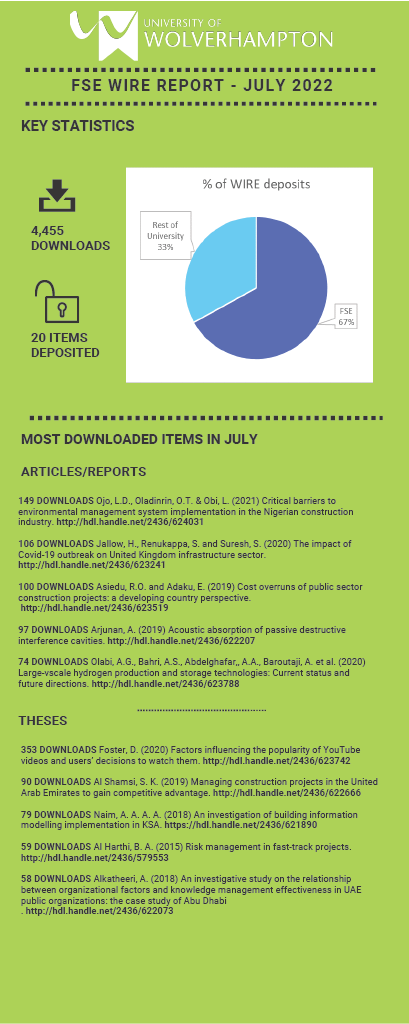"The IRUS reports and data manipulation are quite exciting. I value IRUS very much as a service"
The challenge
Stuart Bentley, the scholarly communications librarian at the University of Wolverhampton, has responsibility for the university's repository. Stuart wanted to share up-to-date information about the repository and help colleagues across the university understand the institution's current rate of REF compliance. To do this, Stuart's team needed to gather and manipulate trustworthy data into a useful format to share with various stakeholders across the institution, including units of assessment coordinators, research deans and members of senior management.
The solution
To provide accurate and reliable insights into the repository, Stuart and his team create university-wide monthly reports using a range of different data. Google Analytics enables the team to record the number of website visitors, and IRUS is another key data source that Stuart's team use to build their reports. Stuart prefers to use IRUS for usage statistics rather than their repository provider because he finds IRUS statistics to be more reliable. With IRUS statistics, he has a better understanding of what is actually being counted and more confidence in the consistency and handling of robots.
Using the IRUS website, Stuart can share useful information such as how many downloads there have been, and what the top five article and thesis downloads are, based on unique item requests, for each month. Stuart remarked on the ease of manipulating data in IRUS and the time he saved in doing so:
"It saves me time because I can manipulate data on the website, rather than downloading spreadsheets and then manipulating data afterwards. This has made it a lot easier for me to select different aspects of the data to look at and explore."
The faculty of science and engineering saw further potential in using IRUS usage statistics as a promotional tool within their department. They requested a tailored report for the faculty's subset of deposits to demonstrate to researchers the benefits of depositing work in the repository. To achieve this Stuart uses the options in IRUS's Custom Item Report to export the downloads (Unique Item Request) and associated identifiers. By matching these item identifiers against known faculty of science and engineering research outputs in the repository, Stuart can work out how many downloads there are for that faculty. The report presents the most downloaded items within the faculty and a pie chart showing the percentage of deposits that comes from the faculty of science and engineering compared with the University as a whole.

Image supplied by the University of Wolverhampton.
The impact
Stuart attends quarterly faculty research committee meetings where the reports are discussed. The reports feed into evaluating the strategy around open access and open research at the university.
The faculty of science and engineering have been pleased with their reports, which prove to researchers how much attention items in the repository receive, encouraging further engagement with the repository.
"They see the reports as a motivational tool for the faculty. They can share the reports with researchers and say, 'look how things are going, you should be putting things into the repository because we're getting this many downloads on the items that have been deposited.'"
Stuart has also been impressed by the flexibility that the IRUS reports and website provide, which has made the task of producing tailored departmental reports possible. He feels confident that he can use the IRUS reports to answer specific queries from academic colleagues.
"I find the new reporting platform very exciting in terms of having all these different levels of things that you can add in and take out. It has speeded up some of the processes for me. I don't think I could have done the faculty of science and engineering report without it."
